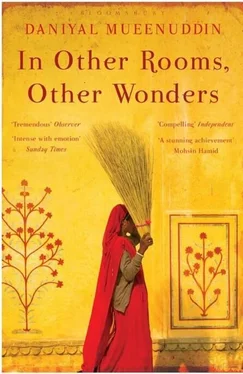‘Jam Sahib had his creatures and creations, as such men do — freshly minted princes of industry and millionaire bureaucrats from humble families — and these gentlemen were made to understand that luxury vehicles, customized Mercedes limousines or the very latest models of jeep, would be acceptable gifts. The vehicles duly paraded in on the new-laid roads and were parked in a special compound, for all to see. Then, the second day into the festivities, while presiding over a magnificent dinner, Jam Sahib suddenly fell to the ground in front of the whole Assembly. A stroke had left him incapable of speech and paralyzed on one side. That night, under cover of darkness, a strange procession slipped out from the tent city. The vehicles that had been brought as gifts crept away, never to be seen again by Jam Sahib or his daughter.’
Makhdoom Talwan stood up. ‘Think about this story, and then think about your position. Your father is gone, but you’re nevertheless a fortunate man, your father left you with a great deal of land and money. Enjoy what you have and learn to know your level. Most of all, don’t let what now belongs to you be taken away. The first thing for you is to be safe. I’m speaking as your elder, and I offer you this counsel as repayment for the many years of support your father gave me. Goodbye.’
A few days later Makhdoom Talwan sent a group of lesser politicians to Shabir, requesting him to step aside during the by-election in favor of another man, a sleek lawyer from the city. They all promised to back Shabir in the next election, if he would just for now withdraw, and even prevailed upon him to take part in one of the lawyer’s political meetings. The crowd, trucked in from the surrounding villages and in the mood for fun, munched on peanuts and sweets — for years on end the politicians ignored or abused the peasants, and then in election years the people abused the politicians. Called to the podium, removing his glasses from a case and putting them on, Shabir looked out on a shoal of grinning and unfriendly faces. He had barely begun his little speech, urging support for the lawyer, when someone in the back made a loud farting sound, silencing him. Two men, on far opposite sides of the crowd, began shouting back and forth to each other.
‘Hello brother. What do you have there?’ bellowed one of them.
The other man held up an enormous cucumber. ‘Do you know what they say? The world is like a cucumber. Today it’s in your hand, tomorrow it’s up your ass.’
‘Now that, my friend, is pure poetry. Kind of a metaphor — something you’re sharing with the honorable speaker up on the stage, I suppose.’
The two went on in the same vein until finally the lawyer-candidate stood up and took Shabir by the arm, hustling him off the podium and toward the cars, apologizing and saying they would definitely find out who had arranged this outrage, get to the bottom of it no matter where the trail led, and punish the guilty ones thoroughly.
As he was driven out of the stadium, Shabir’s skin crawled with shame, his face itched, and in order to relieve the silence he drummed with his fingers on the windowsill. His eyes were unwillingly drawn to Mustafa’s opaque expressionless face — this sole companion of his father’s triumphs. ‘First thing tomorrow,’ he promised himself, ‘I’m going to fire this man.’
I AM A sessions judge in the Lahore High Court. I should tell you at the start, so that you understand my position regarding these events, that despite my profession I don’t believe in justice, am no longer consumed by a desire to be what in law school we called ‘a sword of the Lord’; nor do I pretend to have perfectly clean hands, so am not in a position to view the judicial system with anything except a degree of tolerance. I render decisions based on the relative pressures brought to bear on me. A few more words about myself. My wife, to put it in the clearest terms, is a shrew. She quite truthfully insists that without her I would still be a lawyer without briefs, roaming the courts looking for clients, or clamoring at the bar and groveling at the feet of judges whose greatest ambition, when they wake each morning, is to sell themselves for a good price. The car I drive is another of my trials. I fit inside of it like an orangutan in a shipping cage; but for the moment, on a gazetted salary of fourteen thousand rupees, I do not presume to get a bigger one. The British built the large but run-down house in which I am quartered. My wife got this residence allotted to us by spending a month camped in the living room of her second cousin, a deputy additional secretary, and our greatest fear is that someone senior to me will see it and covet it and take it. I look out on the little brown lawn, without flowers, for we don’t wish to make too much of a show by hiring gardeners, and hear my brats making a mess behind me, and such are my evenings.
There are three servants in my house, a cook, a sweepress, and a bearer. All three have the mute expression of servants in a modest household such as mine: lordly dishonest valets, the sort who are immune to colds but are martyrs to dyspepsia, work for ampler men than me. I believe the cook has a setting, as they say, with the sweepress, although he has a wife and children somewhere up by Kohat. The bearer, named Khadim, is a boy of twenty, from one of the villages in the valleys near Abbotabad. He has no personality whatsoever. He cleans, takes care of the children, washes the car, waters the few plants arranged along the driveway, brings lunch in a tiffin carrier to my office, lays out my clothes, and does all this with a lugubrious expression consistent with the tone of the house, which smells of cooking and damp walls, and which my wife has decorated with small glass objects, a constant source of discord, for the children are always breaking them. The bearer is gentle in a bovine sort of way and he works at half speed but consistently. He has no opinions and no dissipations, at least that I know of, although as a judge I am often amazed by the behaviors of seemingly mild people. In short, he is the ideal servant.
Khadim is permitted one week’s vacation each year, which he spends at his village up in the mountains. One day I came from the office, went for my walk in the Lawrence Gardens — I’ve put on weight — and settled down with the paper. The boy brought the tea, straightened the napkin, asked if he should pour me a cup, and generally drew attention to himself. He wouldn’t leave, and finally I looked at him over my glasses, a habit I’ve acquired in the courtroom, and asked if he wished to say something.
‘Sir, I must go home,’ he said.
The ‘must’ sank in. ‘Perhaps,’ I said, ‘you don’t feel the need any longer for your position in this household?’
‘I haven’t been home for many months, sir. My mother isn’t well.’
‘I see, a supplement to her annual illness. I don’t care, go ask the lady of the house — though it won’t do any good.’
Strangely, she agreed, though she usually requires months of notice before giving leave to the servants. I hardly know how he earned this great dispensation — nor do I care. The boy is handsome; and you need only see her disjoint a roast chicken to know the depths or heights of her carnality. (Thinking back almost twenty years to our first little house, the bare rooms and the kisses — kisses! — I bestowed on her, I consider how little I knew this iron lady, or knew myself for that matter.)
Two days later I received a phone call from the boy’s brother, a useless sort of fellow who periodically comes to Lahore and sponges off the kitchen.
‘And how, I ask, do you presume to interrupt me in my chambers?’
‘Sir, forgive me. Khadim is in Abbotabad jail for the murder of my wife. He is accused of pouring kerosene over her and setting it aflame.’
Читать дальше












